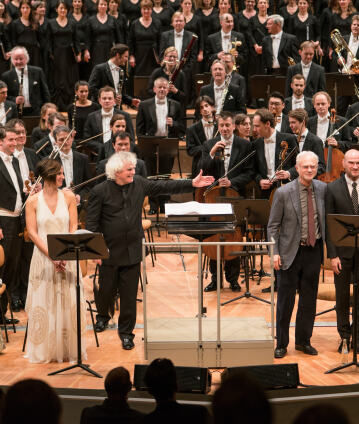Simon Rattle conducts “The Gospel According to the Other Mary”

Maria Magdalena is one of the most fascinating female figures in the Bible. In The Gospel According to the Other Mary, composer John Adams and librettist Peter Sellars recount the Passion of Christ from her perspective. Just as multi-faceted as the story is Adams’s irresistible music, in which minimalism is mixed with imaginative orchestration and jazzy verve. Sir Simon Rattle conducts the Berliner Philharmoniker.
It was a novelty in the history of the Berliner Philharmoniker when the orchestra invited a director to a residency for the 2015/16 season, namely Peter Sellars. This was preceded by many months of intensive collaboration for the scenic “ritualisations” of Bach’s St Matthew Passion (2010) and St John Passion (2014), developed by Sellars for concerts of the Berlin Philharmonic under Sir Simon Rattle and acclaimed by press and public alike. During his residency Sellars was responsible, inter alia, for a no less intense semi-staged production of Claude Debussy’s only opera Pelléas et Mélisande in December 2015, wonderfully cast with Christian Gerhaher and Magdalena Kožená in the main roles. By then at the latest it was clear that the unprecedented artistic liaison between Sir Simon, Peter Sellars and the Berlin Philharmonic was ensured a place in the orchestra’s history. But the Berlin Philharmonic and their chief conductor also explored new paths in the 2016/17 season; in the Rattle era, they bestowed the honour of a residency on a composer for the first time: John Adams, one of the most influential and at the same time most popular US composers of the post-war period.
In three Berliner Philharmoniker concerts, the past Artist in Residence hands over the baton to the current one as they co-create a joint work: The Gospel According to the Other Mary. The inspiration for this oratorio, which premiered in Los Angeles in 2012, is an apocryphal scripture from the second century A. D., ostensibly written by Mary Magdalene, the first witness to the resurrection of Jesus. Nonetheless, this collaboration between Peter Sellars and John Adams does not aim to rewrite the Bible. The libretto, conceived by Sellars as a text collage, refers back both to passages from the Old and New Testaments and to writings by mystic women from the Middle Ages, feminists and political activists of the 20th century and literary accounts from Holocaust survivors.
Adams handles this approach to the Passion of Christ and its significance for our times, which is both non-denominational and timeless, with a music in which, among other things, three countertenors adopt the role of the Evangelist as we know it from Johann Sebastian Bach’s Passions. And so the circle is complete, taking us from Peter Sellars’s staging debut with the Berlin Philharmonic to the compositional language of John Adams, who translates musical traditions into our time.
© 2017 Berlin Phil Media GmbH
Related interview
Artists
Our recommendations
- Simon Rattle and Elīna Garanča at the Baden-Baden Easter Festival
- Paul Whiteman’s greatest hits with Simon Rattle and Max Raabe
- Dance project: “Swing Symphony”
- Europakonzert 2011 from Madrid with Simon Rattle and Cañizares
- Season opening 2010: Sir Simon Rattle conducts Mahler and Beethoven
- Simon Rattle conducts Beethoven’s Ninth Symphony in Madrid